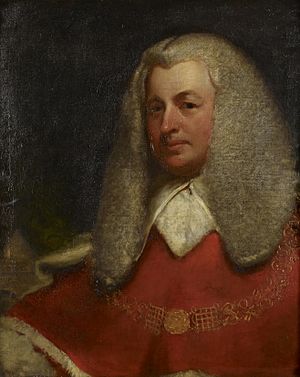Lloyd Kenyon, 1st Baron Kenyon facts for kids
Quick facts for kids
The Lord Kenyon
|
|
|---|---|

Lord Kenyon, by William Davison (floruit 1843)
|
|
| Lord Chief Justice | |
| In office 4 June 1788 – 11 April 1802 |
|
| Monarch | George III |
| Preceded by | The Earl of Mansfield |
| Succeeded by | The Lord Ellenborough |
| Master of the Rolls | |
| In office 30 March 1784 – 4 June 1788 |
|
| Preceded by | Sir Thomas Sewell |
| Succeeded by | Sir Richard Arden (later Lord Alvanley) |
| Attorney General | |
| In office 26 December 1783 – 31 March 1784 |
|
| Prime Minister | Pitt the Younger |
| Preceded by | John Lee |
| Succeeded by | Sir Richard Arden (later Lord Alvanley) |
| In office 18 April 1782 – 2 May 1783 |
|
| Preceded by | James Wallace |
| Succeeded by | James Wallace |
| Personal details | |
| Born |
Lloyd Kenyon
5 October 1732 Gredington, Flintshire, Wales |
| Died | 4 April 1802 (aged 69) Bath, England |
| Nationality | British |
| Profession | Barrister |
Lloyd Kenyon, 1st Baron Kenyon, (born October 5, 1732 – died April 4, 1802) was an important British lawyer and politician. He held several high-ranking jobs in the legal system. These included Attorney General, Master of the Rolls, and Lord Chief Justice.
Kenyon was born in Wales to a country gentleman. He went to school in Hanmer and then Ruthin School. Instead of going to university, he became a clerk for a lawyer. He later joined the Middle Temple to become a barrister (a type of lawyer).
Contents
Early Life and Education
Growing Up in Wales
Lloyd Kenyon was born on October 5, 1732, in Gredington, Flintshire, Wales. His father, also named Lloyd Kenyon, was a country gentleman and a local judge. His mother was Jane Eddowes.
School Days
Young Lloyd first went to school in Hanmer. People said he started his career with very few advantages. When he was 12, he moved to Ruthin School. There, he learned French and Latin and was a top student. However, he didn't learn much Greek or science. Some even joked he believed the sun went around the Earth!
Choosing a Career in Law
As a second son, Lloyd first thought about becoming a priest. But he decided to study law instead. He spent five years working as a clerk for a lawyer named Mr. W. J. Tomkinson. He was very good at his job, especially with legal documents. After his older brother died, it was decided he would become a barrister. He joined the Middle Temple in London in 1750. In 1756, he officially became a barrister.
Becoming a Barrister
Starting His Legal Journey
When Lloyd Kenyon first became a barrister, he didn't have many cases. This was because he hadn't gone to university, which usually helped with connections. He lived on money from his father and other relatives. He spent time watching famous judges like Lord Mansfield in court.
Building His Practice
Kenyon's early work was mostly dealing with property documents. To earn more money, he started working on cases in Wales, using contacts from his old clerk job. He also worked at local courts in Oxford and Shrewsbury, where he found more success.
His career really took off thanks to his friend, John Dunning. Dunning was a busy lawyer who started giving many of his cases to Kenyon. This helped Kenyon gain experience and a good reputation. Soon, other lawyers began hiring him directly. Within 10 years, he was earning a lot of money just from giving legal advice.
Famous Cases and New Friends
Kenyon also became the lawyer for the Duke of Richmond. He helped the Duke win control of several areas in Parliament. In 1780, Kenyon successfully defended Lord George Gordon in a famous case about treason. This made him even more well-known.
Around the same time, he became friends with Lord Thurlow. When the top judge in Chester passed away, Thurlow made sure Kenyon got the job. This friendship also helped Kenyon get more cases in the Court of Chancery, a special court dealing with fairness and property.
A Career in Politics
Becoming a Member of Parliament
In 1780, Lloyd Kenyon became a Member of Parliament (MP) for Hindon. This was thanks to his friend Lord Thurlow. In April 1782, he was made Attorney General. This was a big step, as he hadn't even been a Solicitor-General before.
As Attorney General, he mainly spoke about money owed to the government. He worked closely with William Pitt the Younger, who later became Prime Minister.
Master of the Rolls
In 1784, Kenyon became the Master of the Rolls. This was an important judicial role. He was asked to stay in Parliament to help Pitt's government. He became a strong supporter of Pitt. He even helped Pitt's candidates win votes in Welsh areas.
Kenyon eventually decided that politics wasn't for him. He said that making laws was a task he didn't feel good at. After some political arguments, he stopped speaking in Parliament for the rest of his life.
Serving as a Judge
Master of the Rolls (Judicial Role)
After leaving active politics, Kenyon focused on his job as Master of the Rolls. In this role, he dealt with cases about fairness and property. Even though he wasn't very familiar with some of the older laws, he was very efficient. Another famous judge, Lord Eldon, said that Kenyon handled more cases than anyone else in his time.
Lord Chief Justice
In 1788, Lord Mansfield retired as Lord Chief Justice. This is one of the most important judicial positions in England. Lloyd Kenyon was chosen to take his place. He was also given the title Baron Kenyon.
Some lawyers were a bit worried at first. They thought Kenyon might not know enough about common law, as he had worked more in the Court of Chancery. But he proved to be an excellent judge. He was known for being very strict on moral issues.
One funny story about him was his use of Latin. He often used it incorrectly. King George III once joked, "My Lord... it would be well if you would stick to your good law and leave off your bad Latin."
Kenyon was praised for making the common law simpler and stronger. He served as Lord Chief Justice for almost 14 years until he passed away in Bath in 1802.
Personal Life
In 1773, Lloyd Kenyon married his cousin, Mary Kenyon. They had three sons: Lloyd (who died before him), George, and Thomas.
People described Kenyon as a very quick thinker and a hard worker. However, some also noted that because he didn't go to university, his knowledge was sometimes limited to just the areas of law he practiced. He was also seen by some as a bit arrogant. Despite some criticisms of his personality, he was widely respected as a judge for his deep legal knowledge, careful decisions, and strong honesty.
Images for kids
 | John T. Biggers |
 | Thomas Blackshear |
 | Mark Bradford |
 | Beverly Buchanan |



